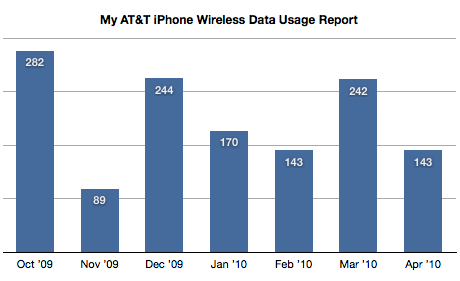Some famous mustaches and some just famous men who happened to have a mustache.
Gedy Rivera’s Sweet Inspiration →
Reader-supported curation of design inspiration for print, web, packaging, typography, and more. Sweet.
Federico Viticci on Reeder for iPad →
A nice, first-look review of the forthcoming iPad version of Reeder. I’ve been using NetNewsWire on my iPad since day one, but I use Reeder on my iPhone.
Preview.fm →
Lightning-quick sampling of iTunes albums, wrapped in minimalism. Does Marco do anything that’s not awesome?
My AT&T Wireless Data Usage

Here is a look at how many megabytes of data I have used in the last seven months.
I expected December to be high since that is when we host the onething conference. Everything gets progressively more erratic during the last few weeks leading up to onething, and flat out ballistic once the four-day event starts. But I am shocked to see October as my highest month of usage. That was the month Anna and I took a week-long vacation to the Ozarks and my phone was literally turned off for seven days.
Being able to tether my iPhone to my laptop, as cool as it is, is not worth the more expensive plan and the $20 a month tethering fee. So I won’t be keeping my current “unlimited” plan and will instead be downgrading to the 200MB for $15 plan. Even if I do need an additional 200MB on occasion it will still just be equal to the $30 I’m paying now.
Here is a roundup from Macworld on the new data plan changes. Here are directions for how you can create your own iPhone data usage report. And here is Neven’s report, from whom I was spurred to post my own.
Tim Van Damme Likes Reading on the iPad →
Me too.
The Quest for Frisson →
A great follow-up article by Roger Ebert on the aforelinked Wired article. Basically the Internet is not unlike a video game, in that it provides a series of addictive stimulations of the brain (frissons).
The Web Shatters Focus, Rewires Brains →
A sobering and insightful article by Nicholas Carr in the latest issue of Wired on the Web as “an interruption system”. The incessant interruptions of the Web which we receive and allow (and even crave) effect our long-term mental growth and strength, as well as our general ability to focus on something.
We crave the new even when we know it’s trivial.
And so we ask the Internet to keep interrupting us in ever more varied ways. We willingly accept the loss of concentration and focus, the fragmentation of our attention, and the thinning of our thoughts in return for the wealth of compelling, or at least diverting, information we receive. We rarely stop to think that it might actually make more sense just to tune it all out.
And here, citing research by Patricia Greenfield:
She concluded that “every medium develops some cognitive skills at the expense of others.†Our growing use of the Net and other screen-based technologies, she wrote, has led to the “widespread and sophisticated development of visual-spatial skills.†But those gains go hand in hand with a weakening of our capacity for the kind of “deep processing†that underpins “mindful knowledge acquisition, inductive analysis, critical thinking, imagination, and reflection.â€
The Web can be a place of growing in knowledge, creativity, and inspiration, but by the nature of our interaction with it we actually diminish our ability to learn, create, and be inspired.
Setups & Spaces →
Nice weblog by Frank Valletutti with photos and interview of folk’s work spaces. It is always fascinating to see how people set up their rigs, and what type of creative environment they thrive in.
Dave Caolo’s Review of Wired’s Magazine App →
They sold 24,000 apps in 24 hours, and deservedly so. What a fantastic app and experience. Like Dave says in his review: “It’s fun.”
I love how the app saves your spot in each individual article. I love the load screen — it’s simultaneously overstimulating and fascinating. And I love the mixture of audio, video, photos, and text.
In his letter to us iPad users, Chris Anderson, the editor in chief, says this issue is only the beginning of Wired’s transition to tablet publishing. I’m very much looking forward to what’s to come, but five bucks a pop is a lot for a single issue.
Doing Is the New Telling →
Seth Godin:
If you’re in marketing and you’re not in charge of the doing, you’re not going to be able to do your job.
iPad + Velcro →
Cute video by Jesse Rosten of two of mankind’s greatest inventions.
MarsEdit Icon Evolution
MarsEdit 3 takes off with a shiny new icon. Here’s a look at the past versions:

MarsEdit 3 →
It is here, and it is stunning.
I’ve been fortunate enough to be beta testing ME 3 since the beginning and I can’t imagine writing shawnblanc.net without it. Most notable for me is the added support for WordPress custom fields, which — combined with the WP Linked List URL plugin I use — make posting links on my site a breeze.
Daniel is an absurdly talented developer for the Mac, and MarsEdit 3 is a rock solid piece of software. It is one of the most-used, most-important, and most-beloved applications I own.